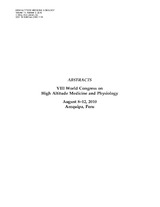Mostrar el registro sencillo del ítem
The relationship between perinatl hypoxia and sleep-disordered breathing in preclinical chronic mountain sickness
| dc.contributor.author | Julian, Colleen Glyde | |
| dc.contributor.author | Vargas, Enrique | |
| dc.contributor.author | Dávila, R Daniela | |
| dc.contributor.author | Salinas Salmón, Carlos E | |
| dc.contributor.author | Rodríguez, A | |
| dc.contributor.author | Gonzales, Marcelino | |
| dc.contributor.author | Moore, Lorna G | |
| dc.date.accessioned | 2016-10-03T13:14:05Z | |
| dc.date.available | 2016-10-03T13:14:05Z | |
| dc.date.issued | 2010-08-08 | |
| dc.identifier.uri | http://repositorio.umsa.bo/xmlui/handle/123456789/8120 | |
| dc.description.abstract | Introduction: Chronic intermittent hypoxia due to sleepdisordered breathing is implicated as a potential etiological factor for chronic mountain sickness (CMS). Whether sleepdisordered breathing precedes or results from CMS is not known. Likewise, factors responsible for sleep-disordered breathing in CMS are not well understood. Based on our preliminary data that perinatal hypoxia increases susceptibility to excessive erythrocytosis (EE, Hb 18.3 g/dL), a preclinical phase of CMS, we sought to determine whether respiratory characteristics during wakefulness or sleep differ between EE subjects and controls and, if so, to determine the relationship of this variation with perinatal hypoxia. | es_ES |
| dc.language.iso | en | es_ES |
| dc.publisher | High Altitude Medicine & Biology | es_ES |
| dc.subject | HIPOXIA PERINATAL | es_ES |
| dc.subject | DESORDENES EN EL SUEÑO | es_ES |
| dc.subject | MAL CRÓNICO DE MONTANA | es_ES |
| dc.title | The relationship between perinatl hypoxia and sleep-disordered breathing in preclinical chronic mountain sickness | es_ES |
| dc.type | Article | es_ES |

